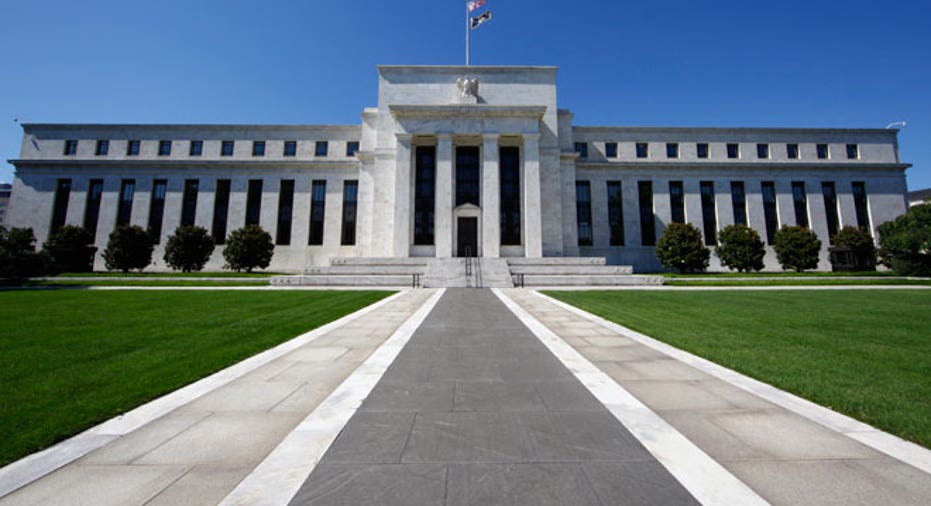FOMC Should Ignore Market Pressure for Action

The U.S. Federal Reserve is under intense pressure to do something -- anything -- to satiate the market’s demand for action.
Nevertheless, calmer voices believe the Fed’s top policy makers will continue to ignore the outside influences and resist the temptation to try to kick-start the flagging economy by pumping more money into the system.
At least for now.
If the Federal Open Market Committee, which set wraps up its two-day meeting Wednesday, disappoints by not announcing something that resembles new stimulus, it’s all but certain financial markets will respond with a big selloff.
A tantrum, so to speak.
Peter Cardillo, chief market economist at Rockwell Global Capital, said “there’s a good possibility” that the market “will stamp its feet” if the Fed takes no action.
But that’s alright, according to Cardillo, who doesn’t believe the Fed will announce any significant new measures Wednesday. Stock markets have been moving steadily higher for months, he said, and they can withstand a temporary downdraft prompted by investors angry with the Fed.
“It’s not like 2008,” Cardillo noted, when any selloff was liable to cause a panic.
A similar -- although arguably more acute -- situation is playing out in Europe, where the European Central Bank is meeting also under intense pressure to act.
The problem is that there’s really very little the Fed can do at this point to spur economic growth. It stands to reason if there was something the Fed could do to create more jobs, unclog stagnant housing markets and prod consumers into spending more, Fed policy makers would have done it by now. The same goes for European fiscal leaders.
“In reality, the Fed has little ability to spur stronger growth..."
Since the worst of the financial crisis in 2008, the Fed has kept interest rates at the historically low range of 0%-0.25%, and pledged to maintain those low rates until the end of 2014. In addition, the Fed has purchased nearly $3 trillion in securities via two rounds of quantitative easing.
In spite of these measures, the economy is still sagging. Unemployment remains above 8% and each of the last four monthly jobs reports has been disappointing. Last week, the government reported that GDP had slowed to 1.5%, down from 2% during the first quarter. Simply put, the economy isn’t growing fast enough to generate the number of jobs needed to reduce the unemployment rate.
Consequently, the markets want another round of quantitative easing. But while investors are howling for action, many analysts are urging the Fed and its counterparts in Europe to ignore the pressure and look at the facts. Namely, that the problems facing the U.S. and Europe are too big for them to be easily remedied by some new initiative by central bankers.
“In reality, the Fed has little ability to spur stronger growth while the best the ECB can hope for is to bring some stability to European financial markets rather than reigniting genuine economic growth,” said David Kelly, chief global strategist at J.P. Morgan Funds.
The most likely scenario for Wednesday’s announcement is another strongly worded pledge to take action if it becomes necessary to do so, echoing nearly every Fed message since November of 2010, when the last quantitative easing program was announced.
Or the Fed could do something without really doing anything, such as pledging to maintain low interest rates past the currently announced deadline of 2014 and into 2015. That was the strategy in June, when the Fed announced it would extend its program of swapping short-term assets for long-term assets in an effort to drive down long-term interest rates. Operation Twist, as the plan is known, was extended through the end of the year.
Given the starkly different opinions within the FOMC itself, another round of quantitative easing, QEIII, is unlikely just now.
Ever since the Fed started its unprecedented program of intervention nearly four years ago a debate has simmered among FOMC members, some of whom believe the Fed’s easing policies haven’t worked and will inevitably lead to inflation. These minority dissenters believe the Fed should step back and let market forces take hold.
The majority of FOMC members, led by Bernanke, believe the financial crisis and recession that followed would have been markedly worse if not for the dramatic actions taken by the Fed. This group is determined to remain active in an effort to stave off another recession.
For two years the Fed has resisted outside pressure to take dramatic action, even as all economic indicators show the recovery is not taking hold. Notwithstanding the expected wrath of investors, that isn’t expected to change on Wednesday.



















